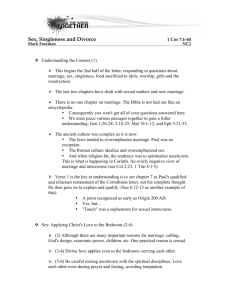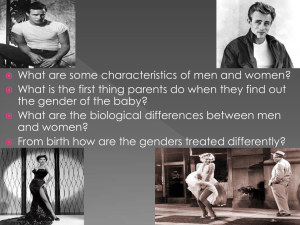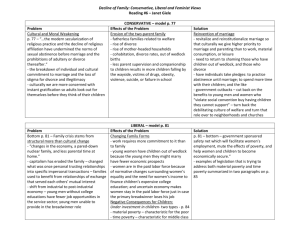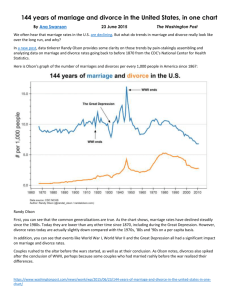Marriage, Singleness, Divorce, and Remarriage
advertisement
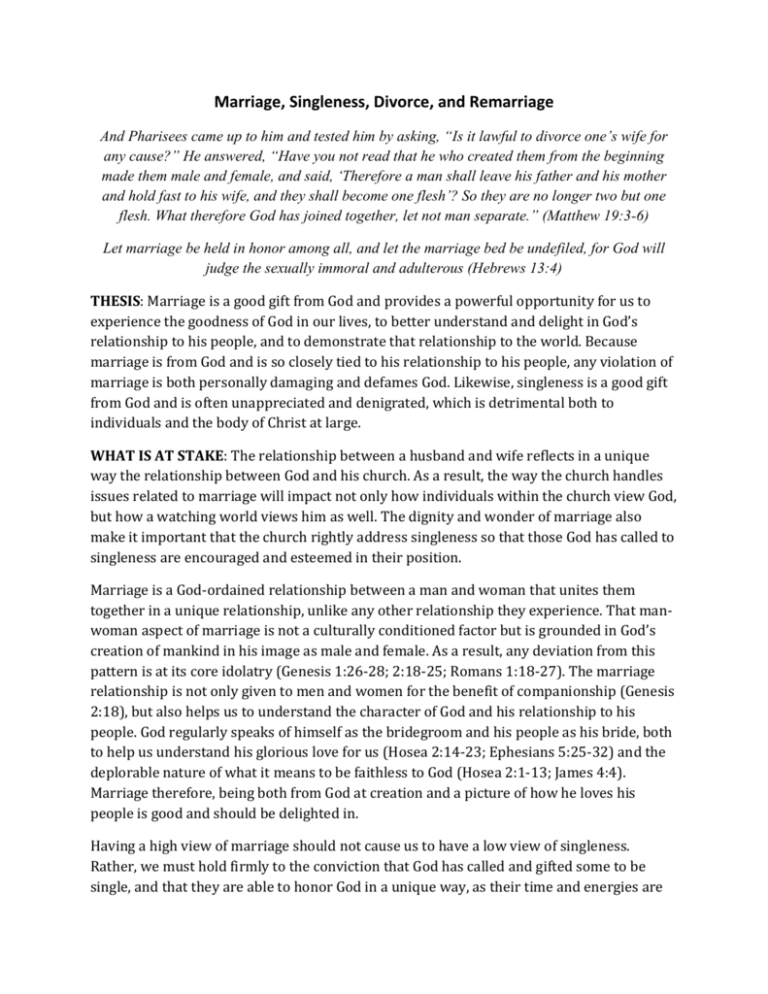
Marriage, Singleness, Divorce, and Remarriage And Pharisees came up to him and tested him by asking, “Is it lawful to divorce one’s wife for any cause?” He answered, “Have you not read that he who created them from the beginning made them male and female, and said, ‘Therefore a man shall leave his father and his mother and hold fast to his wife, and they shall become one flesh’? So they are no longer two but one flesh. What therefore God has joined together, let not man separate.” (Matthew 19:3-6) Let marriage be held in honor among all, and let the marriage bed be undefiled, for God will judge the sexually immoral and adulterous (Hebrews 13:4) THESIS: Marriage is a good gift from God and provides a powerful opportunity for us to experience the goodness of God in our lives, to better understand and delight in God’s relationship to his people, and to demonstrate that relationship to the world. Because marriage is from God and is so closely tied to his relationship to his people, any violation of marriage is both personally damaging and defames God. Likewise, singleness is a good gift from God and is often unappreciated and denigrated, which is detrimental both to individuals and the body of Christ at large. WHAT IS AT STAKE: The relationship between a husband and wife reflects in a unique way the relationship between God and his church. As a result, the way the church handles issues related to marriage will impact not only how individuals within the church view God, but how a watching world views him as well. The dignity and wonder of marriage also make it important that the church rightly address singleness so that those God has called to singleness are encouraged and esteemed in their position. Marriage is a God-ordained relationship between a man and woman that unites them together in a unique relationship, unlike any other relationship they experience. That manwoman aspect of marriage is not a culturally conditioned factor but is grounded in God’s creation of mankind in his image as male and female. As a result, any deviation from this pattern is at its core idolatry (Genesis 1:26-28; 2:18-25; Romans 1:18-27). The marriage relationship is not only given to men and women for the benefit of companionship (Genesis 2:18), but also helps us to understand the character of God and his relationship to his people. God regularly speaks of himself as the bridegroom and his people as his bride, both to help us understand his glorious love for us (Hosea 2:14-23; Ephesians 5:25-32) and the deplorable nature of what it means to be faithless to God (Hosea 2:1-13; James 4:4). Marriage therefore, being both from God at creation and a picture of how he loves his people is good and should be delighted in. Having a high view of marriage should not cause us to have a low view of singleness. Rather, we must hold firmly to the conviction that God has called and gifted some to be single, and that they are able to honor God in a unique way, as their time and energies are not divided between caring for a family and focusing more exclusively on the Lord (1 Corinthians 7:32-35). Those who are unmarried should never be treated as second-rate or made to feel like they will only be valuable contributing members of the body of Christ until they are married. Rather, they should be encouraged to use their singleness to the glory of God, whether it is a temporary or life-long calling. Divorce, the breaking of the covenant of marriage, is so serious because it is an undoing of what God has joined and damages the glorious picture of God’s faithfulness to his bride (Matthew 19:6; Malachi 2:13-16). Divorce is permitted, though not mandated, in two situations. The first is when one spouse has committed adultery, thereby breaking the marriage covenant and joining themselves to another (Matthew 19:9). The second is when an unbelieving spouse wishes to be divorced. Christians married to unbelieving spouses should not seek divorce, but should desire to see their spouses saved, but in the event the unbeliever wishes to divorce them, they are free in that matter. (1 Corinthians 7:10-16). Separation of believing spouses, while never good, is permissible (1 Corinthians 7:10-11), and may be necessary. In the case of any type of physical abuse, separation should always occur immediately. An abused spouse should seek their safety and their children’s safety, and then seek pastoral care. Reconciliation should not be rushed but only carried out when there is fruit demonstrating repentance. In the case of physical abuse, one of the fruits of repentance is the humble acceptance of the consequences of their abuse, including separation, civil consequences, and church consequences. Those who are separated should be reconciled, or if that is not possible, should remain unmarried (1 Corinthians 7:11). Remarriage in cases of divorce is permitted when the divorce occurred because of sexual immorality (Matthew 19:9) or when an unbelieving spouse has requested a divorce (1 Corinthians 7:15). SO WHAT: The issues surrounding marriage, singleness, divorce, and remarriage are intensely personal. God has created us with a need to be in relationships, not only with himself, but with other people. Marriage is most intimate expression of this need and serves a unique purpose of helping us understand and show God’s love to our spouses, our families, the church, and the world. As a result, these matters must be treated with care, sensitivity, seriousness, and above all be addressed biblically. Marriage must be held in honor in the church (Hebrews 13:4), which means fighting for marriages. Yet the church must love and care for those who are divorced, mourning with them and helping them bear their burdens (Romans 12:15; Galatians 6:2), and exhorting them to repentance when necessary, restoring them with gentleness (Galatians 6:1). Finally, singleness must be celebrated, and singles must be encouraged in the role that God has given them as essential members of the body of Christ (1 Corinthians 12:12-26) For a further discussion and explanation of the positions presented here, see the supplemental document “Further Explanations Regarding Questions of Divorce and Remarriage.”

